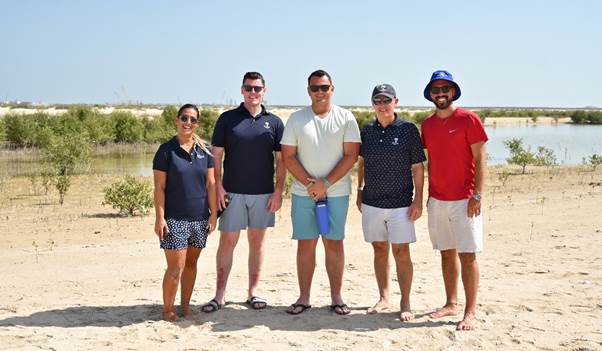Dubai Golf continues to bolster its sustainability efforts, partnering with the Emirates Marine Environmental Group (EMEG) to safeguard the Emirati coastline, by planting ecologically-beneficial mangroves and releasing critically endangered Hawksbill Turtle hatchlings.
Led by the Emirates Marine Environmental Group, team members from Dubai Golf, Topgolf Dubai, Dubai Creek Golf and Yacht Club, Emirates Golf Club and Jumeirah Golf Estates gathered at the Jebel Ali Marine Reserve to plant new mangrove plants. The reserve is used as a base to develop and organise educational camps for schools, community members, and corporate groups in an effort to increase awareness and understanding of environmental issues.
The Jebel Ali Marine Reserve is currently home to more than 1.5 million mangrove plants, with more than 300,000 planted in 2023 alone. The UAE has consistently made great strides in conservation and sustainability, with a goal to plant over 100 million new mangroves along the coastline by2040.
“Conserving the ecosystem in the UAE is essential to longevity, and an important element of our business practices,” commented Chris May, CEO of Dubai Golf. “It’s a constant learning curve for all of us. I’m proud that representatives from all our golf clubs in Dubai were present at this event to plant crucial Mangrove plants and demonstrate how important conservation is for future development.”
“The planting of these mangrove plants is essential to the flourishing of all ecosystems in Dubai, as they absorb four times more carbon dioxide than a terrestrial plant. They are also the ideal plant to restore coastal habitats,” added Morea Tomasi, Director of Marine Conservation projects at EMEG. “The planting of the mangroves is just the beginning, small steps in the right direction can lead to huge changes to ensure a greener approach to the future of Dubai. It is very important for us to continue working with organisations such as Dubai Golf, to create a greater platform and raise awareness of the need to futureproof our coastlines.”
Mangroves are trees that usually live in salty water and grow near the coast, playing a crucial role in stabilising soil and protecting coastal communities from sea erosion. Mangroves mitigate the effects of climate change and create a functional ecosystem for the survival and reproduction of certain species of fish, birds, and insects. They are also crucial for carbon sequestration.
The event at the Jebel Ali Sanctuary kicked off with presentations from EMEG President, Major Ali and EMEG Marine Director, Morea Tomasi regarding the importance of mangroves. A demonstration of how to properly plant the mangroves and safety briefing took place before seven representatives from Dubai Golf clubs began planting mangroves.
In addition to mangrove planting, one of the EMEG’s other key projects is the monitoring and preservation of the Hawksbill Turtle species. The beaches at the reserve are protected nesting places that allow the turtles to breed without the risk of their nests being invaded by foxes. Once safely hatched, the baby turtles are then released into the wild by the team at EMEG. As part of the mangrove planting event, the Dubai Golf team also helped to release the group of hatchlings into the sea.
The mangrove initiative and releasing of the turtle hatchlings link with Dubai Golf’s wider sustainability and climate change awareness plan that includes projects such as the implementation of more solar panels and the eradication of plastic goods.
The EMEG’s mission is to preserve biodiversity in the region by following five crucial steps: protecting endangered wildlife through conservation strategy, actively participating in endangered species conservation efforts, advancing scientific research through collaboration, promoting environmental education within the local community and conserving fragile ecosystems for future generations.

